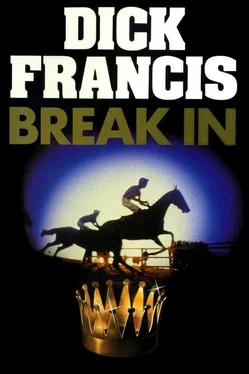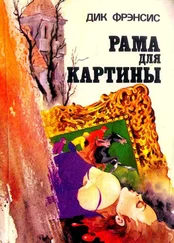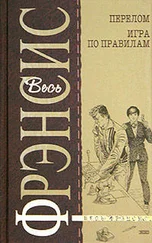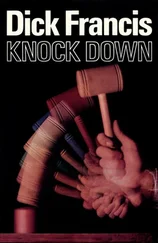‘Might,’ Holly said, unconvinced.
‘Doing everything one can think of is better than doing nothing,’ I said. ‘You never know which pellet might kill the bird when you loose off the shot.’
‘Poetic,’ Holly said sardonically. ‘All right. We’ll try.’
‘And what about the solicitor?’ I asked.
‘Bobby says he’ll find a better one today. Not local. In a London firm. High powered.’
‘Some of his owners may know who’s best,’ I said. ‘If not, I could get him a name from one of the people I ride for.’
‘Great.’
‘But do you know something?’ I said.
‘What?’
‘I’m not so sure that Maynard was very far wrong. All this aggro is aimed as much at him as at Bobby.’
‘Yes,’ Holly said slowly. ‘When we read today’s bit of dirt, that’s what Bobby thought too.’
‘I wouldn’t mind betting,’ I said, ‘that a fair few copies of Intimate Details, episodes one, two and three, will find their way to the attention of the Honours’ Secretary in Downing Street. And that this was chiefly what was at the bottom of Maynard’s anger yesterday. If Maynard is really being considered for a knighthood, Intimate Details could have put the lid on his chances, at least for just now.’
‘Do you think it would? Just a few words in a paper?’
‘You never know. The whole Honours thing is so sensitive. Anyway it’s about now that they send out those ultra-secret letters asking Mr Bloggs if he would accept a medal if invited. They’ll be drawing up the New Year’s Honours’ List at this moment. And the sixty-four dollar question is, if you were the Honours’ Secretary drawing up a list for the Prime Minister’s approval, would you put Maynard on it?’
‘But we don’t know that anything like that is happening.’
‘No, we sure don’t.’
‘It’s probably just the Flag being its typically vicious, mean, destructive self.’
‘Perhaps,’ I said.
‘You know how nasty the Press can be, if they want to. And the Flag seems to want to, all the time, as a matter of policy.’
‘Mm,’ I said. ‘Maybe you’re right.’
‘But you don’t think so?’
‘Well... It would make more sense if we could see a purpose behind these attacks, and stopping Maynard getting a knighthood would be a purpose. But why they’d want to stop it, and how they got to hear of it... hell alone knows.’
‘They didn’t hear about any knighthood from our telephone,’ Holly said positively. ‘So perhaps they’re just making it up.’
‘Everything else in those stories is founded on things that have happened or been said,’ I pointed out. ‘They’ve taken the truth and distorted it. Shall I write to the Honours’ Secretary and ask if Maynard’s on his provisional list?’
‘Yes, yes, funny joke.’
‘Anyway,’ I said. ‘How did Bobby get on with the telephone people?’
They said they would look into it. They said telephone tapping is illegal as of 1985. They didn’t send anyone here yesterday looking for bugs. They said something about checking our exchange.’
‘The exchange? I didn’t know people could tap into an exchange.’
‘Well, apparently they can.’
‘So no actual bugs?’
‘We told them we couldn’t find any and they said we probably didn’t know where to look.’
‘Well, at least they’re paying attention.’
‘They said a lot of people think they’re being bugged when they aren’t,’ Holly said. ‘All the same, they did say they would look.’
‘Keep them up to it.’
‘Yes.’
‘I’ll ring you this evening when I get back from Devon,’ I said. ‘If I don’t get back... I’ll ring sometime.’
‘Yes,’ she said. ‘Take care of yourself.’
‘Always do,’ I said automatically; and both she and I knew it was impossible. If a steeplechase jockey took too much care of himself, he didn’t win races, and there were days occasionally when one couldn’t drive oneself home. I was superstitious to the extent of not making binding commitments for the evenings of race-days, and like most other jump jockeys accepted invitations with words like ‘If I can’ and ‘With luck’.
I drove the two hours to the Devon and Exeter meeting with my mind more on Holly and Bobby and Maynard than on the work ahead. None of the five horses I was due to ride posed the problems of North Face, and I’d ridden all of them often enough to know their little quirks and their capabilities. All I had to do was help them turn in the best they could do on the day.
The Devon and Exeter racecourse lay on the top of Halden Moor, a majestic sweep of bare countryside with the winds blowing vigorously from the Channel to the Atlantic. The track itself, with its long circuit of almost two miles, stretched away as a green undulating ribbon between oceans of scrub and heather, its far deserted curves as private a place as one could imagine for contest of horse and man.
Unfashionable in Ascot terms, distant geographically, drawing comparatively small crowds, it was still one of my favourite courses; well run, well kept, with welcoming locals, nice people.
The princess liked to go there because friends of hers maintained one of the few private boxes, friends who had a house down by a Devon beach and who invited her to stay regularly for the meetings.
She was there, lunched, fur-coated and discreetly excited, in good time for the first race, accompanied in the parade ring by a small bunch of the friends. Three friends, to be exact. The couple she stayed with, and a young woman.
The princess made introductions. ‘Kit... you know Mr and Mrs Inscombe...’ We shook hands.’... And my niece. Have you met my niece, Danielle?’
No, I hadn’t. I shook the niece’s hand.
‘Danielle de Brescou,’ the niece said. ‘Hi. How’re you doing?’ And in spite of her name she was not French but audibly American.
I took in briefly the white wool short coat, the black trousers, the wide band of what looked like flowered chintz holding back a lot of dark hair. I got in return a cool look of assessment; half interest, half judgment deferred, topped by a bright smile of no depth.
‘What shall we expect?’ the princess asked. ‘Will Bernina win?’
Wykeham, naturally, had not made the journey to Devon. Moreover he had been vague when I’d talked to him on the telephone, seeming almost unclear as to Bernina’s identity, let alone her state of readiness, and it had been Dusty, when I’d handed him my saddle to put on to the mare before the race, who had told me she was ‘jumping out of her skin and acting up something chronic’.
‘She’s fit and ready,’ I said to the princess.
‘And Wykeham’s riding instructions?’ Mr Inscombe enquired genially. ‘What are those?’
Wykeham’s instructions to me were zero, as they had been for several years. I said diplomatically, ‘Stay handy in fourth place or thereabouts and kick for home at the second last hurdle.’
Inscombe nodded benevolent approval and I caught the ghost of a grin from the princess, who knew quite well that Wykeham’s instructions, if any, would have taken the form of ‘Win if you can’, an uncomplicated declaration of honesty by no means universal among trainers.
Wykeham produced his horses fighting fit from a mixture of instinct, inherited wisdom, and loving them individually as athletes and children. He knew how to bring them to a peak and understood their moods and preferences, and if nowadays he found the actual races less interesting than the preparation, he was still, just, one of the greats.
I had been his retained jockey for the whole of the main part of my career and he frequently called me by the name of my predecessor. He quite often told me I would be riding horses long dead. ‘Polonium in the big race at Sandown,’ he would say, and, mystified, I would ask who owned the horse as I’d never heard of it. ‘Polonium? Don’t be stupid. Big chestnut. Likes mints. You won on him last week.’ ‘Oh... Pepperoni?’ ‘What? Yes, Pepperoni, of course, that’s what I said. Big race at Sandown.’
Читать дальше




